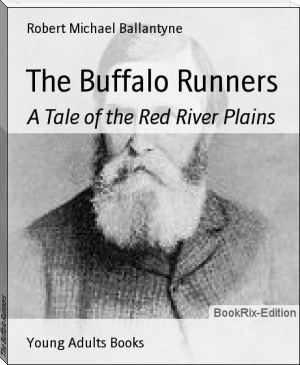The Buffalo Runners - Robert Michael Ballantyne (read aloud .txt) 📗

- Author: Robert Michael Ballantyne
Book online «The Buffalo Runners - Robert Michael Ballantyne (read aloud .txt) 📗». Author Robert Michael Ballantyne
Whatever may have been the private opinion of the braves as to this new and very unexpected style of address, the effect of it was pacific; for, after a little more palaver, the peace-party carried the day--or, rather the night--and, next morning, the Cree warriors went back to their tents and hunting avocations, leaving Okematan to return to the camp of his friends the buffalo runners.
CHAPTER SIXTEEN.
AN EVENING IN THE CAMP.
It was daybreak when Fergus McKay galloped into camp with the startling news that an attack by hostile Indians might be expected that day or the following night. He was, of course, unaware of the fact that the peace-making Okematan had been unwittingly following his tracks at a more leisurely pace.
Some readers may think that the Indian, with his traditional power of following a trail, should have observed and suspected the fresh track of the hunter, but it must be remembered that some hundreds of buffalo runners had passed over the same track a day or two previously, and that Hawkeye, or Pathfinder himself, would have become helpless in the midst of such trampled confusion. Besides, Okematan had no reason to suspect that he had been followed; still less that the camp of the war-party had been accidentally discovered.
"Now, boys," said Fergus, after detailing his adventures during the night, "we will hev to give up all notion o' buffalo runnin' this day an' putt the camp in a state o' defence."
There was a good deal of grumbling at this, especially among some of the younger men; for they were very keen to commence the sport, and had not much belief in the power of a small band of savages to do them harm. Some of them even suggested that half of their number should remain behind to guard the camp while the other half should go after the buffalo. This proposal, however, was not received with favour, as it would certainly be a matter of disagreement which half was to go out, and which to remain behind!
"Where is Kateegoose?" asked Dechamp at this crisis.
"Stuffin' 'imself, of course!" said Fred Jenkins, amid a general laugh. "I've noticed, since we set sail on this trip, that Kateegoose always turns out at daybreak, lights the galley fire, an' begins the dooties o' the day by stuffin' 'imself."
"Ay, and I've noticed," observed one of the young hunters, "that it takes a deal o' stuffin' to fill him out properly, for he keeps on at it most part o' the day."
"Except," remarked another, "when he stops to smoke what o' the stuffin' has been already shoved down."
"Moreover," added the seaman, "I've noticed that Francois La Certe always keeps 'im company. He's a sympathetic sort o' man is Francois, fond o' helpin' his mates--specially when they're eatin' an' smokin'."
At this moment Kateegoose, having been called, came forward. He was an ill-favoured savage, with various expressions on his ugly visage which were not so much Nature's gifts as the result of his own evil passions. Jealousy was one of them, and he had often turned a green eye on Okematan. There were indications about his mouth and fingers, as he came forward, that justified the commentaries on his habits, and betrayed recent acquaintance with fat pork.
"You hear the reports that have just been brought in?" said Dechamp.
"Kateegoose hears," was the laconic answer.
"Kateegoose is a Cree," continued Dechamp; "he knows the spirit that dwells in the hearts of his tribe. What does he think?"
"The thoughts of the Indian are many and deep. He has for many moons watched the behaviour of Okematan, and he has long suspected that the heart of the serpent dwells in the breast of that chief. Now he is sure."
"But what about your people?" demanded the camp-chief. "They are not at war with us. Are they all villains because one among them turns out to be bad?"
Kateegoose drew himself up with a look of dignity, and pouted his greasy lips as he replied--
"The Crees have always been a brave and true and upright people. They never attack friends until, by their conduct, these friends have become enemies. But the Crees are human. They are not perfect--neither are the Palefaces. There are bad men among them--a few; not many--as well as young men and foolish. Sometimes, when on the war-path, a clever bad man can reason with them till he blinds them, and they are ready to do wrong. It may be so now. Okematan is clever. Kateegoose does not know what to advise."
"Kateegoose was not asked to advise," returned Dechamp sternly. "He may return to his tent."
Thus summarily dismissed, this hanger-on or camp-follower returned to his pork and pipe with a feeling that somehow he had failed to make the exact impression on the leader that he desired. La Certe, however, consoled him, and helped him to continue the duties of the day.
"Come with me, McKay," said Dechamp, after giving all needful directions regarding the safety of the camp. "I don't believe that rascal Kateegoose. He's a greedy idler, something like La Certe, but by no means so harmless or good-natured. Moreover, I find it hard to believe that Okematan has turned traitor."
"I agree with you," said Fergus. "It iss ferry hard to believe that a man who has been so long among us, and got such a good character, should suddenly turn against us--an' that, too, without provocation. But what will you be sayin' to what Taniel and myself has seen with our two eyes?"
"It looks bad, I confess," answered Dechamp, as they paced to and fro in a retired part of the camp; "but you must remember that your two eyes are not your two ears, and that you heard nothing that you could understand."
"Fery true, Dechamp. But the language of the eye is sometimes as clear and understandable as the language of the ear. No wan could mistake the meanin' o' some o' the warriors when they scowled an' pointed in the direction of our camp here, an' gripped the handles o' their scalpin' knives and tomahawks. Moreover, Okematan also pointed in the same direction, though I am bound to say he did not grip his knife. Whether he scowled or not I do not know, for he was standin' wi' his back to us."
"Well, I cannot tell. I'm not willin' to believe Okematan a traitor; but what you have seen is enough to make me put the camp in defence instead of startin' out to hunt--"
At that moment the sharp click of a gun was heard as a neighbouring sentry put his piece on full cock.
Dechamp and Fergus hastened towards him.
"Have a care, Andre; don't be too quick with your gun," said the former. "I see only one man coming. He can do us no harm."
As the approaching figure drew near, it was seen to be that of an Indian on horseback. He rode carelessly at a jog-trot.
"It looks like Okematan!" said Dechamp, glancing at his companion in surprise.
"It iss Okematan," returned Fergus.
Before another word could be spoken, a shot was heard in the camp, and horse and man were seen to roll upon the ground. The latter rose immediately, but the horse lay stiff--evidently shot dead. For a few seconds profound silence followed the incident, as if men were too much taken by surprise to think and act. Then, when the dismounted Indian was seen to walk leisurely, as if unhurt, towards them, there was a hubbub in the camp, while men, women, and boys ran towards the spot whence the shot seemed to have been fired, but no one was to be found there. Only a very faint puff of smoke overhead told where the marksman had stood. It had been a well-chosen spot, where a low bush or two mingled with several carts that had been rather carelessly drawn up, and several horses had been picketed together. These had afforded concealment enough for at least a few moments.
The tent of La Certe was not far from this corner. At the time the shot was heard, the self-indulgent half-breed was inside, recumbent on his back in the enjoyment of a pipe.
"That's odd," he said to Slowfoot, who was seated opposite to her lord scraping the remnants of something out of a tin kettle with the point of a scalping-knife. "Somebody's gun gone off by accident, I suppose. I hear some one at our fire. Look out, Slowfoot, and ask what has happened."
Slowfoot finished the scraping of the kettle before obeying; then lifted the curtain that closed the opening of their tent, and peeped out.
"It is Kateegoose--loading his gun, I think."
La Certe got up, with a sigh of regret at the necessity for exertion, and, lifting the curtain-door, stepped out.
"What are they firing at, Kateegoose?"
The Indian did not know. Some one, he thought, might have let off his gun by accident. He thought it wise, however, to be ready, and had just sent the ramrod down the barrel of his gun to make sure that it was loaded with ball. To make still surer that all was ready, the Indian shook the priming out of the pan of his gun, wiped it, and re-primed. Then he laid the weapon down by his side, and resumed the pipe which he had apparently laid down to enable him to perform these operations more conveniently, and, at the same time, with more safety.
At that moment Dechamp walked smartly towards the fire in front of La Certe's tent.
"Does Kateegoose know who fired that shot?" he asked with a keen glance, for his suspicions had been aroused.
"Some one over there," answered the Indian languidly, as he pointed in the right direction.
"It does not need a medicine-man to tell me that," said Dechamp, sternly. "I heard the shot, and saw the smoke. Have you any idea who fired it, La Certe?"
"I have not," replied the half-breed. "I was lying in my tent when I heard it. Kateegoose was smoking beside the fire. We both thought it was an accident, or some one trying his gun, till we heard the shouting and running. Then I jumped up, seized my gun, and sprang out to see what it was all about. I found Kateegoose equally on the _qui vive_. He was shoving his ramrod down to make sure his gun was loaded when you came up. What is it all about?"
"Only that the horse of Okematan has been shot under him by some one, and that there is a would-be murderer in the camp."
"Okematan! Has the traitor ventured to return?" exclaimed Kateegoose, with an expression of surprise that was very unusual in an Indian.
"Ay, he has ventured," responded Dechamp, "and some one has ventured to fire at him with intent to kill. By good luck he was a bad shot. He missed the man, though he hit and killed the horse. But I shall find the rascal out before long--he may depend on that!"
So saying, the commandant left the spot.





Comments (0)